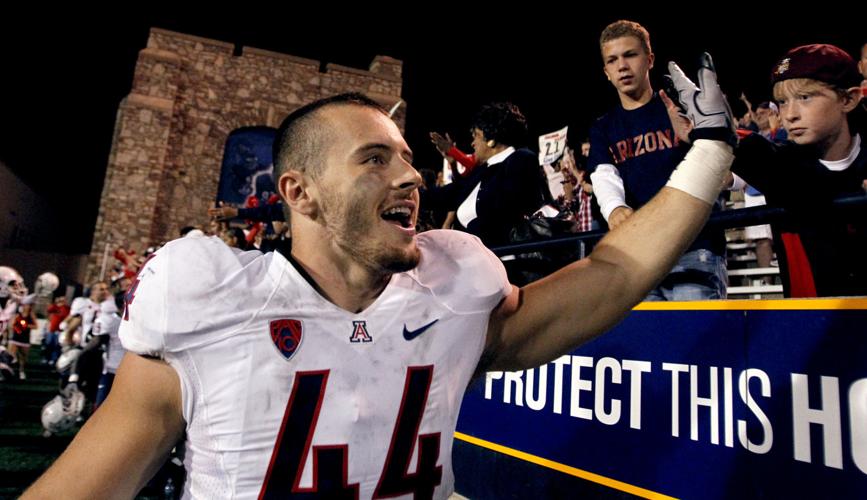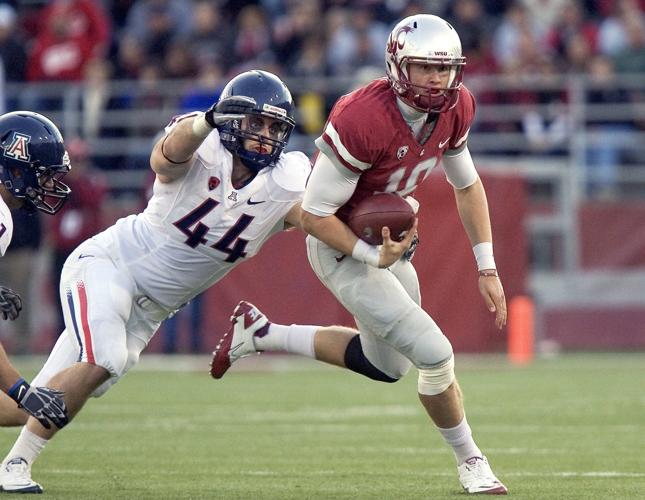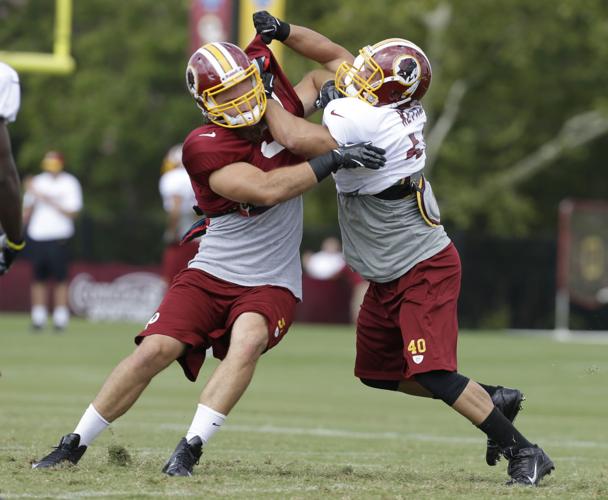His days of chasing quarterbacks long behind him, Rick Elmore still can’t stop running.
If you remember Elmore from his Arizona Wildcats career — he was known as Ricky back then, or No. 44 — you remember his motor: a nonstop, revved-up, won’t-dare-slow-down motor that took him from tiny Grace Brethren High in Simi Valley, California, to Tucson and all the way to the NFL.
Almost a decade removed from his college days, with a growing family and a budding business, Elmore is showing no signs of slowing down.
What is he running toward?
More importantly, what is he running from?
• • •Tucked into Elmore’s home closet is a sports memorabilia box from his playing days. Inside are mementos and relics, reminders of a life at 120 mph. He was never the fastest, never the strongest, but he was often the best, and the box is full for a reason.
In that box are a handful of recruiting letters that he received as one of the most coveted defensive recruits on the West Coast in the mid-2000s. Starring for Grace Brethren just as it made a transition from 8-man to 11-man football, Elmore helped turn the school into what it is today, one of the best high school programs in the country.
He received letters from just about every school you can imagine, and he’s kept some of the prominent ones. He has some letters from his NFL days, too, including a nice note from then-San Francisco 49ers coach Jim Harbaugh.
Each of the letters has a personal touch, each of them carrying not just a signature, but the thoughtfulness behind it.
Sitting in a classroom at the Eller School of Business one day in 2017, back at the UA attempting to earn a master’s degree in business administration, Elmore listened as a marketing professor extolled the virtues of hand-written notes, which, he said, had a 99% open rate. Elmore, four years removed from pro football and pulling double-duty as a student and a medical device sales rep, thought back to the box in the closet.
“Who doesn’t open real, hand-written envelopes?” he said. “I know I do. I remember when people write me notes. It sticks out. We’ve advanced as a society, communication is easier than ever, but it’s gone all electronic. Everything circles back and the value of a hand-written note in today’s digital world is worth its weight in gold.”
Simply Noted was born.
• • •
They sat in his living room and tinkered over a few beers, Elmore and his long-time friend Steven Josker.
Elmore’s wife, former Arizona softball star Callista Balko, was out for the evening.
Elmore and Josker were a couple of innovators that day, June 23, 2017, and Elmore felt a jolt course through his veins like he hadn’t since he dropped Andrew Luck somewhere in the brown dirt of Palo Alto.
His idea was simple, but brilliant: Is it possible to mass-produce hand-written notes?
Elmore bought a three-axis plotter from China, and along with Josker — a former high school teammate whose father happens to be a rocket scientist — went to work getting the thing to write for them.
Minutes went by. Hours. Finally, they got the thing to turn on. Then — gasp! — it worked. It moved an inch. Elmore had his prototype.
Over the ensuing months, he continued to tinker, and within six months, he was able to produce 500 letters with the look and feel of being individually hand-written, flaws in penmanship and all.
Still a medical device salesman for Neodent by day, Elmore sent out 500 letters to 500 doctors. Thirty-two called him back, which, if you ask anyone in the medical device sales industry, is like batting .800.
“These doctors would never have met with me, but this was a way to get by the gatekeeper,” he said. “I sold $300,000 of new business and I get a phone call from my boss. ‘Whoa, what’s working here?’”
Elmore felt vindicated.
“An atomic bomb of light bulbs went off,” he said. “Like, this validates what I’ve been thinking and obsessing about for a year. It works. From that point on, it’s been about 16 hours a day. I wake up at 5 doing emails, work out, family stuff for an hour, work all day, family stuff, and then once kids are down, I’m back in the office.”
That relentless motor that you remember, the one that led to more than two dozen sacks at the college level — including a Pac-10 leading 11 sacks in 2010 — is now employed full time behind Simply Noted.
He is sprinting, full-speed, toward success.
What is he running toward?
• • •OK, so the last month has been good.
How good?
We won’t get into numbers, but, suffice to say — good. This Thanksgiving, there was a lot of thanks to go around the table.
Callista knows it, mainly because of the rambling.
“I work from home, too, so sometimes he’ll come into my office and we’ll have a little talk, and it’s really cute to see him get excited,” she said. “I know when he’s excited because he’s pacing the room and he starts rambling. It’s happened a few times recently. He’ll ramble about 10 years from now. I’ve heard the same story 100 times. He just needs to talk through it.”
They’ve been together 13 years now — Ricky and Callista started dating in the spring of her junior year, his freshman year — and she laughs like only a wife can. This is, after all, their third child.
There is Rekker, 2, and Piper, a newborn, and Simply Noted, still in its infancy. If it weren’t for her, who knows where the company would be?
“She gave me the push I needed,” Elmore said. “I kept dipping my foot in the pool. She said I need to do this. She believes in me. I overthink everything. Every time I doubt myself, she kind of shakes me, like, ‘You got this.’ She kind of gave me that talk. ‘Rick, you’re going to do this. You’re going to be great or die trying. If it doesn’t work, it won’t be because you didn’t try.’ When she backed me 100%, and she was bought in, that made do it. Making that phone call to my company was like oooh, the worst. It gave me a pit in my stomach.”
That was about 13 months ago. They became a one-income family, with Callista, a former Canyon Del Oro High School turned UA national champion, holding down the fort in her role as Director of Regional Development for their alma mater in Maricopa County.
Callista nudged Rick to finally make the dive in part because of her own unrealized entrepreneurial aspirations. In her early 20s, fresh out of Arizona and her ultra-successful stint with the Wildcats, she had an idea for a softball-related business. She never followed through.
“I regret not doing that,” she said. “That’s what encouraged me to push him. We’re still young in our careers. If our kids were older and in sports and we needed money for club sports? No, this is the time to do it. We’re on house arrest, anyway — we have young kids. Now is the time to pump in the hours so that when they’re older, we can enjoy it more.”
It’s not always smooth sailing. No new business is.
“There’s been a lot of mornings, with a 2-year-old and a 1-month-old, when I’m up at 3 in the morning, talking to myself, ‘Am I crazy?’” he said. “Two days later, something amazing happens, a great customer, a new deal. Those wins keep putting the wind in your sail.”
Most of all, he’s found a second calling.
His first, football, ended without much fanfare.
After finishing his college career with 25.5 sacks, still good for 11th in the Pac-12 rankings, Elmore was drafted by the Green Bay Packers in the sixth round of the 2011 NFL Draft. After making it through much of the preseason, he was cut by the Packers on Sept. 3 that year and added to the San Francisco 49ers practice squad in early January of 2012. He was cut soon after, and signed with the then-San Diego Chargers. He lasted seven months with the Chargers before being released on the eve of the 2012 season, signing soon after to the Arizona Cardinals’ practice squad. He lasted less than a month there, then joined both Cleveland and Washington before calling it quits in 2013.
Elmore was shattered to say goodbye to the sport he loved.
For a while, he floundered.
“I was searching desperately when I left football,” he said. “That transition from football to life is really hard. You’re around guys with a similar passion, a similar want to achieve a certain amount of success, for so long. You leave, and you don’t have that any more. You don’t have that competitive outlet.”
His wife had a front-row seat.
“We talked about it all the time,” Callista said. “The NFL was like a carrot. He was like one step away, always. For a female student-athlete, at least in this era, it’s not like that for us. For me, the transition was easier. I knew there was no professional future, or at least no financial future (in softball). When you’re that close to making that kind of salary, where you can change the trajectory of the history of your family, everything changes. That’s a hard bullet to bite when you know it’s that close.”
Becoming an entrepreneur has enthralled him in a way that he hasn’t felt, professionally, since the end of his football career.
“I’m trying to do something every second of every day,” he said. “I’m going through old texts, ‘Who haven’t I followed up with?’ I call them Follow-up Fridays. I would probably give most people an anxiety attack if they sat next to me.”
So that’s what he’s running toward.
Not just a financially secure future for his family, and not just a successful business, but a new calling.
A new playing field.
• • •
What is he running from?
“This goes back to seventh grade,” he begins.
Elmore had a teacher. Won’t say the name. Won’t say the school.
The teacher said something that has never left him.
“You better get used to saying, ‘Do you want fries with that?’” he recalls being told as a child, as if the phrase is forever chiseled into his cerebellum.
“It’s really stuck with me,” he said. “I’ve been on this journey throughout my life to be better and to prove to myself I can do whatever I want as long as I work hard. Good things don’t come easy to me, I’ll tell you that right now. Yeah, I’m a tall guy, but I’m not naturally fast or naturally smart. I’m just a guy who has been given the ability to persevere and to work my butt off.”
With success, Callista hopes, he can move past his past.
“He tells me he hopes this chip can fall off his shoulder,” she said. “I don’t know if it ever will.”
So maybe it dates back to then.
Or maybe it dates back to the beginning of his Wildcat football career, which was the end of his twin brother, Cory’s.
The Elmores had been a package deal to Arizona, spurning offers from Oregon and a host of other West Coast schools. Rick, the defensive stalwart, and Cory, the hulking offensive lineman, rated in the top 40 of his position in the country.
Both redshirted as freshmen in 2006, then entered spring ball ready to contribute. During one practice, Rick’s heart rate was elevated, so during spring break, both brothers went in for routine checkups back in Simi Valley.
Rick was cleared. Cory had a hole in his heart.
It had somehow gone undetected. It would require surgery, and even though he was ultimately cleared to return to football, his Arizona career was all but overs. The brothers would never play together again.
“We all face it one way or another,” Cory said. “We just go through it differently. When Rick was done, he was ready to be done. When I was done, I wasn’t ready to be done. There was something left in the tank.”
When Rick Elmore first had the idea for Simply Noted, one of the first phone calls was to his brother, who now works in wealth management in Nashville.
“If anything, I was trying to convince him to make it a side hustle,” Cory said. “But his idea was if he can dive into it, it’ll go quicker. He’s always wanted to be the person to lead. For people to look to him to take charge. I’m more a company man. If you need something to get done, he’s the one who steps up. I’m like reason and he’s like brawn. He runs through the door, and I’m like, ‘Wait! The door unlocks!”
Theirs is a close relationship, the unique kind that only twins can have.
When Cory hurt, so too did Rick.
Now in happier times, Cory is imploring Rick to celebrate his wins.
“It’s not that he’s never satisfied, but there is a desire in him, an insatiable hunger to succeed,” Cory said. “It’s a blessing and a curse. He needs to focus on the little victories he gets. I remind him all the time to enjoy the process.”
Sometimes, with all this running, Rick finds himself running on empty.
Or, maybe, there’s just a hole that will never fill.
• • •What is he running from?
They were seven, the Elmore boys, when their father, Ron, died.
A heart issue.
“He’s never talked about feeling like he’s going to have a short life,” Callista said. “His dad was 35. Rick has been a leader in his family, and I think he feels a sense of responsibility to be the rock and always have it together. With that comes this feeling of being financially together. He puts a lot of pressure on himself that no one else puts on him.”
Sometimes, it can be hard to shake.
“I’m a doomsday guy,” he said. “I can be having a great day, but … sometimes I feel like death is always sprinting after me. That mentality is in everything. I can never relax.”
Arizona fans can remember seeing that mentality manifest itself on game days.
Ricky Elmore was always running, you remember.
Still is.





